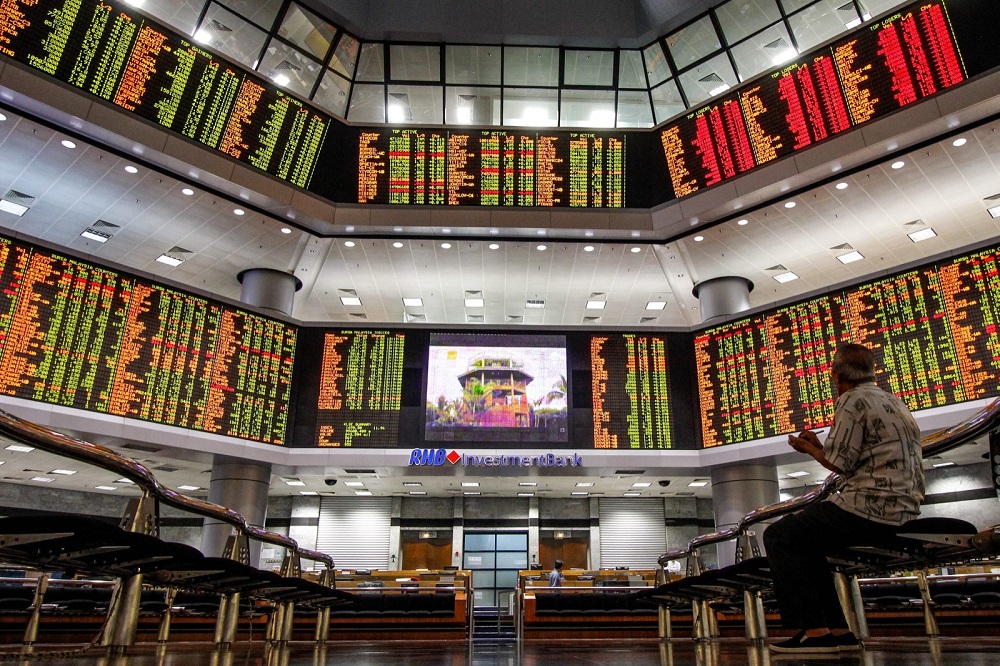KUALA LUMPUR, Nov 16 — Bursa Malaysia is expected to remain lacklustre next week, drifting towards the 1,590 support level as sentiment was clouded by the slow progress in the US-China trade talks and China's weaker-than-expected economic data.
China announced a disappointing industrial production growth of 4.7 per cent on-year in October, which sharply missed the median forecast of 5.4 per cent growth in a Reuters poll, while retail sales expansion for the same month also fell short of market expectation and investment growth hit the lowest in more than two decades.
“Growing concerns over global economic slowdown due to the uncertainties in US-China trade talks and geopolitical tensions in Hong Kong should further dampen trading sentiment.
“As the uncertainty risk from the ongoing US-China trade war is still our concern, it is best that risk-averse investors limit their global exposure,” Phillip Capital Management senior vice president (investment) Datuk Dr Nazri Khan Adam Khan told Bernama.
He recommended that investors look for local Shariah-compliant stocks including JAKS Resources Bhd (construction) and Notion VTec Bhd (technology).
On the fundamental front, Nazri said that he foresaw that plantation-related counters to support the barometer index due to positive prospect of the industry.
Among others, Malaysia has signed an agreement with a significant supply chain manager for the export of palm oil next year in the South Asian region, amid an Indian trade association's call to boycott Malaysian palm oil as well as the European Union's potential displacement of palm biofuels.
At the same time, another agreement has been signed with China's Bohai Commodity Exchange, which aims to import about 1.5 million tonnes into China by 2020.
“Besides, India has resumed to buy Malaysian palm oil at a discount offered to Indian refiners (over supplies from Indonesia) after a one-month gap and contracted about 70,000 tonnes of shipments in December. The renewal in purchases by the country, which is the biggest import of Malaysian palm oil could support Malaysian palm oil prices, which are trading near their highest level in two years,” he added.
Meanwhile, Bank Negara Malaysia yesterday released the country’s third-quarter economic data, which showed a year-on-year gross domestic product growth of 4.4 per cent versus 4.9 per cent in the second quarter.
A dealer noted that private consumption declined sharply to 7.0 per cent and said that as the US-China trade war continued, import and export data would continue to see a decline as it was the first affected sector.
“The FTSE Bursa Malaysia KLCI (FBM KLCI) is expected to trade with a downside bias next week on the back of weak local data, trade and local economic outlook. It will range between 1,580 and 1,595,” he said.
For the week just ended, Bursa Malaysia was mostly lower, tracking the softer Asian stock market and affected by external factors including the weak major economies’ data and the ongoing US-China trade war.
On a Friday-to-Friday basis, the FBM KLCI fell 14.98 points to 1,594.75 from 1,609.73 previously.
On the scoreboard, the FBM Emas Index declined 81.95 points to 11,313.77, the FBMT 100 Index retreated 81.25 points to 11,125.81 and the FBM Emas Shariah Index erased 57.83 points to 11,835.95.
The FBM 70 slipped 7.08 points to 14,095.48 and the FBM Ace Index fell 60.34 points to 4,920.07.
Sector-wise, the Financial Services Index contracted 159.82 points to 15,611.73 and the Industrial Products and Services Index eased 1.57 points to 153.38 but the Plantation Index gained 53.39 points to 6,928.54.
Weekly turnover decreased to 11.90 billion units worth RM8.56 billion from 13.80 billion units worth RM9.88 billion last week.
Main Market volume fell to 7.70 billion units worth RM7.61 billion from 9.55 billion units worth RM8.8 billion.
Warrants turnover inched up to 1.6 billion units worth RM332.93 million versus the 1.59 billion units worth RM291.98 million recorded previously.
The ACE Market volume slipped to 2.59 billion units worth RM611.58 million from 2.65 billion worth RM760.66 million. — Bernama






















